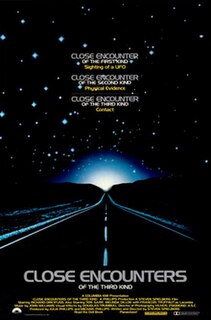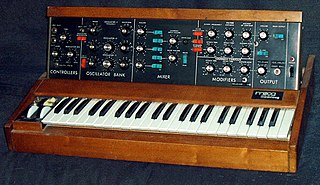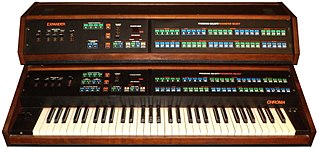
The Rhodes piano is an electric piano invented by Harold Rhodes, which became popular in the 1970s. Like a conventional piano, the Rhodes generates sound with keys and hammers, but instead of strings, the hammers strike thin metal tines, which vibrate next to an electromagnetic pickup. The signal is then sent through a cable to an external keyboard amplifier and speaker.

George Bernard Worrell, Jr. was an American keyboardist and record producer best known as a founding member of Parliament-Funkadelic and for his work with Talking Heads. He is a member of the Rock and Roll Hall of Fame, inducted in 1997 with fifteen other members of Parliament-Funkadelic. Worrell was described by Jon Pareles of The New York Times as "the kind of sideman who is as influential as some bandleaders."

Close Encounters of the Third Kind is a 1977 American science fiction film written and directed by Steven Spielberg, starring Richard Dreyfuss, Melinda Dillon, Teri Garr, Bob Balaban, Cary Guffey, and François Truffaut. It tells the story of Roy Neary, an everyday blue-collar worker in Indiana, whose life changes after an encounter with a UFO.

An analogsynthesizer is a synthesizer that uses analog circuits and analog signals to generate sound electronically.

ARP Instruments, Inc. was a Lexington, Massachusetts manufacturer of electronic musical instruments, founded by Alan Robert Pearlman in 1969. It created a popular and commercially successful range of synthesizers throughout the 1970s before declaring bankruptcy in 1981. The company earned a reputation for producing excellent sounding, innovative instruments and was granted several patents for the technology it developed.
Ian Robertson Underwood is a woodwind and keyboards player, known for his work with Frank Zappa and the Mothers of Invention.
Alan Robert Pearlman was an American engineer best known as the founder of ARP Instruments, Inc., one of the early leading American synthesizer manufacturers.

Phil Tippett is an American movie director and Oscar and Emmy Award-winning visual effects supervisor and producer, who specializes in creature design, stop-motion and computerized character animation. Over his career, he has assisted ILM and DreamWorks, and in 1984 formed his own company, Tippett Studio.

Two Sides of the Moon is the only solo album by English rock musician Keith Moon, drummer for the Who. It peaked at No. 155 on the Billboard 200. The album title was credited to Ringo Starr. Rather than using the album as a chance to showcase his drumming skill, Moon sang lead vocals on all tracks, and played drums only on three of the tracks, although he played percussion on "Don't Worry Baby". The album features contributions from Ringo Starr, Harry Nilsson, Joe Walsh of the Eagles, Jim Keltner, Bobby Keys, Klaus Voormann, John Sebastian, Flo & Eddie, Spencer Davis, Dick Dale, Suzi Quatro's sister Patti Quatro, Patti's bandmates from Fanny Jean Millington and Nickey Barclay, and future actor Miguel Ferrer.
The ARP 2500 is a monophonic analog modular synthesizer equipped with a set of sliding matrix switches above each module. These are the primary method of interconnecting modules. It is the first product of ARP Instruments, Inc., built from 1970 to 1981.
"Subterraneans" is a song by David Bowie, the closing track of his 1977 album Low. As with most of Side 2, "Subterraneans" is mostly instrumental, with brief, obscure lyrics sung near the song's end.

David Hentschel is an English recording engineer, film score composer and music producer who engineered on George Harrison's All Things Must Pass and Elton John's Goodbye Yellow Brick Road, as well as for such artists as Genesis, Tony Banks, Ringo Starr, Queen, Nazareth, Marti Webb, Andy Summers, Mike Oldfield, Renaissance, Peter Hammill and Ronnie Caryl.

A synthesizer is an electronic musical instrument that generates audio signals. Synthesizers typically create sounds by generating waveforms through methods including subtractive synthesis, additive synthesis and frequency modulation synthesis. These sounds may be altered by components such as filters, which cut or boost frequencies; envelopes, which control articulation, or how notes begin and end; and low-frequency oscillators, which modulate parameters such as pitch, volume, or filter characteristics affecting timbre. Synthesizers are typically played with keyboards or controlled by sequencers, software or other instruments, and may be synchronized to other equipment via MIDI.

Saving Private Ryan: Music from the Original Motion Picture Soundtrack is the soundtrack album for the 1998 film Saving Private Ryan, directed by Steven Spielberg. The album was produced by composer John Williams and distributed by DreamWorks Records. Recorded in Symphony Hall, Boston, Massachusetts, the scores were performed by the Boston Symphony Orchestra, with two of the ten compositions featuring vocals from the Tanglewood Festival Chorus. The soundtrack runs for just over an hour, while the film itself lasts over two hours.
John Peter Robinson is an English composer, musician, and arranger known for his film and television scores.

Tommy is a soundtrack album by The Who with contributions from numerous artists. The soundtrack was used in the 1975 Tommy film that was based on the original album that was released by The Who in 1969. Pete Townshend oversaw the production of this double-LP recording that returned the music to its rock roots, and on which the unrecorded orchestral arrangements he had envisaged for the original Tommy LP were realised by the extensive use of synthesiser. Although unmarked, according the August 9, 1975 issue of Billboard "QLP POLYDOR TOMMY/ORIGINAL SOUNDTRACK RECORDING $9.98" it is Quadraphonic encoded.

The ARP Chroma is a polyphonic, multitimbral, microprocessor controlled, subtractive synthesis analog synthesizer developed in 1979-1980 by ARP Instruments, Inc. just before the company's bankruptcy and collapse in 1981.
The history of home keyboards lies in mechanical musical instrument keyboards, electrified keyboards and 1960s and 1970s synthesizer technologies.











